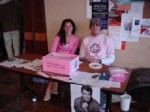Brown Bags Go Pink

Women’s Studies and the Breast Cancer Awareness Coalition (BCAC) culminated Colgate’s celebration of Lee National Denim Day and kicked off Breast Cancer Awareness Month in an emotional and informational brown bag panel discussion. The event, which took place on Friday, October 6 in the Women’s Studies Center, centered on “Remembering the Struggle: Students Share How Breast Cancer has Shaped Their Lives.”
Denim Day, initiated by Lee Jeans in 1996, is a one-day fundraiser to benefit breast cancer research and awareness. Contributors donate money and wear jeans and pink shirts on October 6 to show their support.
At Colgate, the BCAC had a table in the O’Connor Campus Center (Coop), selling pink ribbons and raffle tickets to raise money and advertise for Denim Day.
The panel at the brown bag lunch included Adjunct Professor of the Health Sciences and Director of Student Health Services Dr. Merrill Miller, senior Brea Collier, first-year Amber Codiroli, junior Lisa Henty, senior Kia King and first-year Angelica Chapman.
Each student spoke briefly on how breast cancer had affected her life.
Collier’s mother fought breast cancer for nine years, passing away when Collier was 16.
“I understand that not everyone is passionate about [breast cancer awareness]…but it’s a level of sensitivity that we need to just take a second and recognize about other people,” Collier said, adding that many people can go years without knowing the heartaches of some of their closest friends.
Codiroli spoke about her grandmother, who underwent a mastectomy in order to remove the cancer.
Henty’s mother discovered she had cancer during a routine mammogram in February and had a mastectomy the next month. She is currently undergoing chemotherapy.
“Encourage any female you know to get their mammograms yearly past the age of 40,” Henty said. She also called for college-aged women to perform monthly self-examinations.
According to King, when her mother was diagnosed with breast cancer, it shook her out of her self-centered adolescent mindset. King’s mother had a partial mastectomy, and when her hair began to fall out, she simply shaved her head and refused to wear uncomfortable wigs.
Chapman read a poem she had written on how she would feel if she were diagnosed. The poem focused mainly on the womanly and motherly nature of breasts, moving some of the panelists to sobs.
From there, Miller began the more educational component of the brown bag. She shared some breast cancer statistics, including the fact that, for cancers that are detected early, the five-year survival rate is well over 90 percent.
Like Henty, she strongly suggested that young women begin doing monthly self-exams. The advantage of these regular exams, Miller said, is that a woman grows to know her own breasts and will know when something is wrong.
Miller brought many informational handouts as well as several model breasts and even a set of model testes, saying that 15 to 35-year-old men have the highest incidence of testicular cancer.
Women’s Studies Program Assistant Cassie Quirindongo ’06 said that she was glad for the diversity of the panelists’ stories.
“We had a broad range of experiences in terms of the relative who had it, how they approached it and where they are now,” Quirindongo said.






